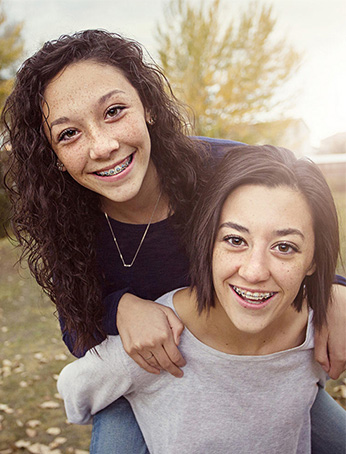Life with Braces
The glue and the cement that holds your brackets and bands on your teeth are only strong enough to allow the braces and the force of the wires to move your teeth, and cannot withstand the forces of biting the wrong food. Please use the following list as a more detailed example of foods to avoid. Keep in mind that excessively broken appliances can prolong treatment time. lt is our goal to treat your case as quickly and efficiently as possible.
Eating with Braces
Don’t worry, you’ll be eating popcorn and snacking on potato chips again in no time! However, before you can start enjoying some of the treats you love, you will need to take special care to avoid any foods that could damage your new appliances.
Foods to avoid with braces:
- Anything crunchy. including nuts, hard pizza crust, hard French bread, and hard shell tacos
- Anything chewy. This includes all candies and tough meat. Cut your meats into small pieces, cut rib meat off the rib, and cut fried chicken meat off the bone. DO NOT BITE IT OFF.
- Apples, pears, peaches, and raw vegetables of any type should be cut into small, bite-size pieces. Chew them on your back teeth. NEVER BITE DIRECTLY INTO THEM.
- Cookies of all types Break them into tiny pieces and chew very carefully.
- Cereal. Small spoonfuls.
- No ice crunching, bone chewing, pen cap chewing or fingernail biting.
- Corn on the cob. Kernels should be cut off.
- Carbonated drinks. Cavity causing bacterias break down the carbonation to cause cavities.
Brush your teeth after eating or drinking carbonated drinks, and remember......by avoiding hard and chewy foods, your braces will stay in place and your treatment will progress smoothly and finish on time.
Foods you CAN eat with braces:
- Dairy — soft cheese, pudding, milk-based drinks
- Breads — soft tortillas, pancakes, muffins without nuts
- Grains — pasta, soft cooked rice
- Meats/poultry — soft cooked chicken, meatballs, lunch meats
- Seafood — tuna, salmon, crab cakes
- Vegetables — mashed potatoes, steamed spinach, beans
- Fruits — applesauce, bananas, fruit juice
- Treats — ice cream without nuts, milkshakes, Jell-O, soft cake
Soreness Caused from Braces and Appliances
When you first get your braces, you may notice that your teeth and mouth feel a little tender or sore. This is perfectly normal and we promise your mouth will not be sore forever! To relieve the pain, we recommend dissolving one teaspoon of salt in eight ounces of lukewarm water. Swish and gargle this solution in your mouth for just a couple of minutes (do not swallow the saltwater).
If the pain is more severe and does not go away after rinsing, you can also try taking a pain reliever. It is also not uncommon for your lips, cheeks, and tongue to become irritated for one to two weeks as they toughen and become used to the braces. We would be happy to give you some wax that you can put over the braces to lessen the tenderness. If you need some wax, please let us know.
Loose Teeth
If your teeth begin feeling a little loose, don’t worry; this is normal! Your braces must first loosen your teeth to move them into the right position. Once your teeth have been repositioned, they will no longer be loose.
Loose Wires and Bands
The wires and bands on your braces may come loose. If this happens, please contact us as soon as possible so that we can check and repair your appliance. If any piece of your appliance comes off, be sure to save it and bring it to the office with you.
You can temporarily fix the loose wire by using the back of a spoon or the eraser end of a pencil to carefully and gently push the wire back into place. If the loose wire is causing irritation to your lips or cheeks, put wax or a wet cotton ball over the broken wire to relieve the pain.
Take Care of Your Appliances
Damaged appliances can increase the length of your treatment process, so be sure to take care of all your appliances. Your teeth and jaw can only move into their correct positions if you consistently wear the rubber bands, headgear, retainer, or other appliances prescribed by your doctor.
Playing Sports with Braces
Game, Set, Match — we have great news for athletes! You can still play sports even while undergoing orthodontic treatment! If you do play sports, it’s recommended that you wear a mouthguard to protect your teeth and your appliance. Let your doctor know if you need help finding the right mouthguard for the best protection.
In case of a sports emergency, be sure to immediately check your mouth and appliance for damage. If you notice any loose teeth or appliance damage, please contact our office right away. You can temporarily relieve the discomfort by applying wax or rinsing your mouth with warm saltwater.


 Website Powered by Sesame 24-7™
Website Powered by Sesame 24-7™